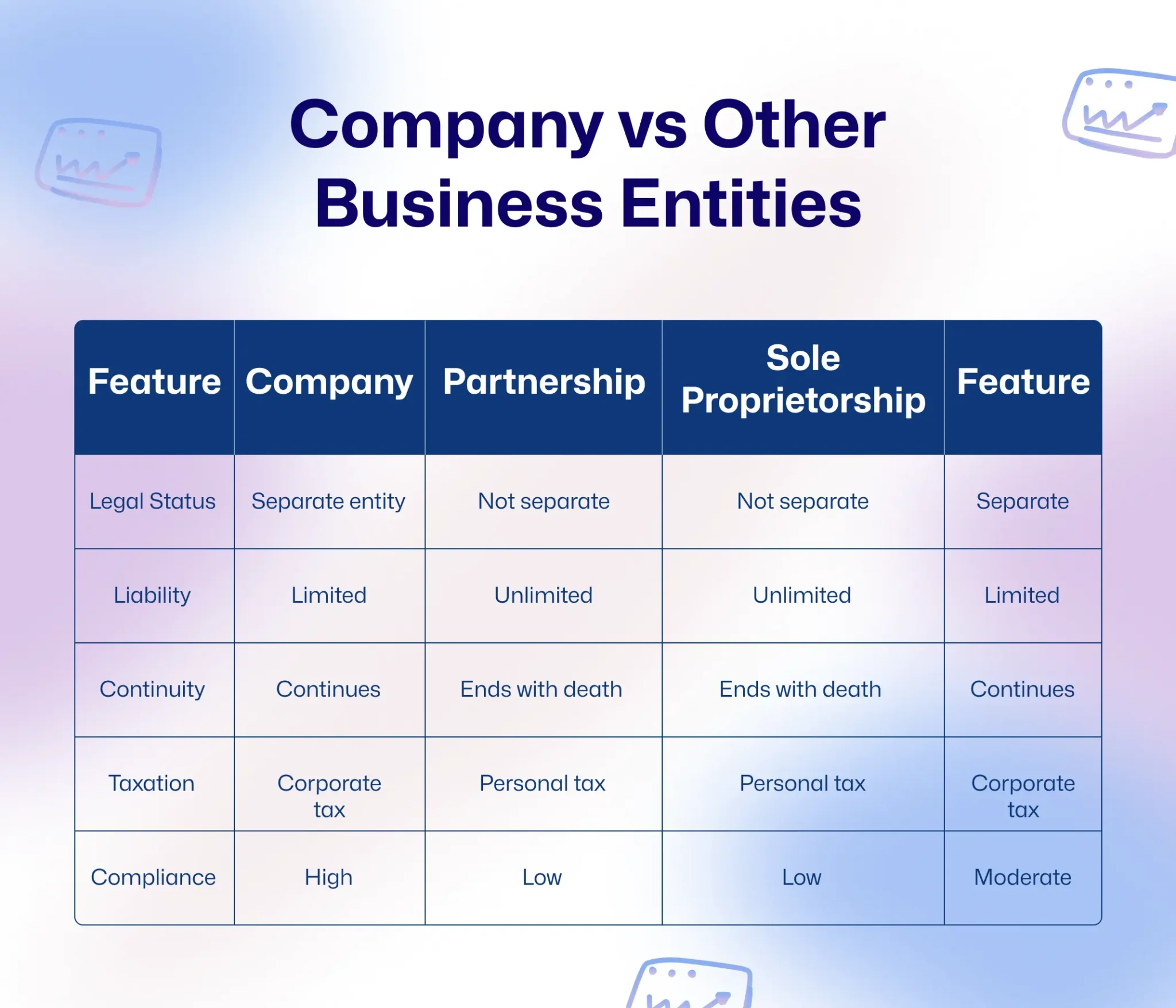Understanding a company’s legal foundation is essential for entrepreneurs, students, and professionals alike. Suppose you’ve ever searched terms like “company what”, “what is company”, or “define company”. In that case, you’re likely looking for a clear explanation of how companies are defined and regulated under the law.
A company is more than just a group of people working together—it’s a separate legal identity created by law. This means it has its rights and duties, separate from the individuals who run or own it. Thanks to this status, a company can continue to operate even if its members change, offering stability and legal safety for everyone involved.
In this blog, we aim to provide a clear and structured explanation of the definition of a company in law by covering the following points:
- What is a company, and how is it defined legally?
- Key legal features that distinguish a company from other business forms
- Different types of companies recognised under Indian law
- Step-by-step process to register a company in India
- Legal rights and obligations of a registered company
- Pros and cons of incorporating a company
- Comparison of a company with other forms of business
- Landmark legal cases that shaped company law
This guide will be invaluable for entrepreneurs, students, and professionals seeking to establish a solid foundation in understanding the legal identity of a company in India.
What is a Company?
A company is a form of business organisation registered under the law that enjoys a separate legal existence. It has rights, duties, and liabilities that are distinct from those of its members or founders.
Legally, the term company refers to an entity that is:
- Incorporated (formally registered)
- Separate from its owners
- Able to enter into contracts, sue, and be sued
This means that a company can carry on business, own property, and make decisions independently of its shareholders or directors.
Legal Definition of a Company
The Companies Act, 2013, defines the term in Section 2(20) as:
“A company means a company incorporated under this Act or any previous company law.”
This legal definition underscores one key point: A company must be registered law to be recognised as such.
Historically, legal systems have recognised the company as an “artificial person”—one created by law and endowed with a legal identity.
Key Features of a Company
Understanding what a company involves, recognising the following legal features:
1. Separate Legal Entity
A company is legally distinct from its shareholders. It can own property, sign contracts, and file lawsuits in its own name.
2. Limited Liability
The personal assets of members are protected. Their liability is limited to the amount they agreed to invest.
3. Perpetual Succession
The company continues to exist even if directors or shareholders leave or pass away.
4. Artificial Legal Person
Although not a natural person, a company can perform all legal acts, such as hiring employees, buying assets, or paying taxes.
5. Common Seal (Optional)
Earlier, the common seal was used as the company’s signature on official documents. Today, it’s optional.
6. Capacity to Sue and Be Sued
A company can initiate legal action or face it under its own name, just like any citizen.
Types of Companies in India
The Companies Act categorises companies based on size, structure, and liability. Here’s a breakdown:
A. Based on Incorporation
- Statutory Company: Formed through a special act (e.g., RBI).
- Registered Company: Formed under the Companies Act.
B. Based on Liability
- Company Limited by Shares: Shareholders’ liability is limited to unpaid share capital.
- Company Limited by Guarantee: Members’ liability is limited to the guarantee they provide in the event of winding up.
- Unlimited Company: No limit on members’ liability.
C. Based on Number of Members
- Private Limited Company: Minimum 2, maximum 200 members. Shares not publicly traded.
- Public Limited Company: Minimum 7 members, no cap. Shares may be listed.
- One Person Company (OPC): Single shareholder, ideal for solo entrepreneurs.
D. Special Types
- Section 8 Company: Non-profit entities for charitable purposes.
- Government Company: 51% or more held by government.
- Foreign Company: Incorporated outside India but operating in India.
How to Start a Company in India – A Step-by-Step Guide
If you’re planning to set up a business, here’s a simplified guide to help you start a company in India:
- Choose a Business Structure – Decide whether you want a Private Limited, Public Limited, OPC, etc.
- Obtain Digital Signatures (DSC) – Necessary for e-filing documents.
- Get Director Identification Number (DIN) – Required for all proposed directors.
- Apply for Name Approval – Use the SPICe+ form to reserve your company name.
- Draft the Incorporation Documents – This includes the MoA and AoA.
- File Incorporation Forms – Submit through the MCA portal.
- Receive Certificate of Incorporation – Once approved, you’ll receive this legal document.
- Apply for PAN and TAN – These are essential for tax and regulatory purposes.
- Open a Bank Account – In the company’s name.
- Start Operating Legally – With all registrations in place, your company is now good to go!
Company vs Other Business Entities
Legal Rights and Responsibilities of a Company
Once registered, a company has:
- Right to sue or be sued
- Right to own assets
- Duty to file tax returns and annual reports
- Duty to hold meetings and maintain records
Failure to fulfil these duties can result in penalties, fines, or even deregistration.
Benefits of Registering a Company
- Credibility and Branding: Clients, banks, and investors prefer dealing with registered entities.
- Access to Funding: Companies find it easier to raise capital from banks, venture capitalists (VCs), and stock markets.
- Limited Liability: Personal assets are protected even if the company incurs losses.
- Perpetual Succession: The company continues to operate despite changes in ownership.
- Global Expansion: A registered company can open branches or subsidiaries abroad.
Drawbacks to Consider
- High Compliance Costs: Annual filings, audits, and regulatory fees.
- Limited Flexibility: Companies are required to adhere to strict rules.
- Transparency Requirements: Disclosure of financials and shareholders.
Despite these, for businesses seeking scale and legal protection, forming a company is often the best choice.
Conclusion
Understanding what a company means in legal terms isn’t just for law students—it’s essential for anyone starting or running a business. If you’re launching a startup, working in finance, or just curious about how companies work, learning what a company is and how it’s set up can help you handle rules and make smart business choices.
If you’re still asking questions like “define company” or “what is a company”, here’s your answer: A company is a distinct legal entity established under statutory law. It can operate independently, enter into contracts, own assets, incur liabilities, and continue perpetually irrespective of changes in ownership or management. This legal status enables it to have a significant impact on the economy and society as a whole.
Connect with FinGuru India to know more.
Book a Consultation with Our Expert!
Call Us: +91-9999127022
Visit: www.FinguruIndia.com






